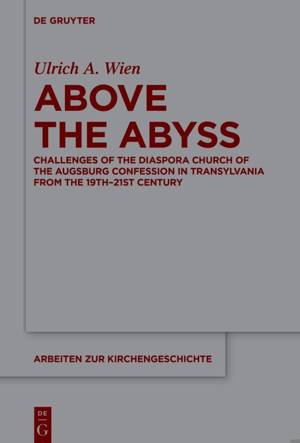
- Retrait gratuit dans votre magasin Club
- 7.000.000 titres dans notre catalogue
- Payer en toute sécurité
- Toujours un magasin près de chez vous
- Retrait gratuit dans votre magasin Club
- 7.000.0000 titres dans notre catalogue
- Payer en toute sécurité
- Toujours un magasin près de chez vous
Above the Abyss
Challenges of the Diaspora Church of the Augsburg Confession in Transylvania from the 19th-21st Century
Ulrich A WienDescription
The book focuses on the threat to free self-development and the effort to ward off a perceived threat of extinction as well as the development of self-preservation forces. The challenges for ethnic and religious minorities in the 19th-21st centuries are explained and unfolded against the historical background that serves as a frame of reference. The royal privileges granted in medieval Hungary were abolished in the mid-19th century. The German-speaking people's church (Saxones) in Transylvania founded on this had to reorient itself, although a pioneer region of religious freedom had established itself behind the "Ottoman Curtain". Since the reception of the Reformation, the "Saxones" had been Protestant. At the end of the 19th century, after the Austro-Hungarian Compromise, this minority realised the concept of cultural Protestantism in its purest form: ethnicity and religion were understood to be congruent. Homogeneity of society was the ideal, and affiliation with the German Empire was intensified. Economy, science, culture, language as well as school and church were understood as a unity; segregation and emigration were frowned upon. This concept fell into crisis due to various developments, including economic ones - especially after the annexation of Romania in 1918. National Socialism was widely adopted, along with anti-Semitism. For exponents of the church leadership, the Confessio Augustana only served as a label. On the one hand, external pressure under communist rule brought about a (only conditionally possible) retraditionalisation, on the other hand, it led to the bleeding out of the congregations due to increased emigration. Free development has only started again since the political upheaval in 1989. The church, which has become small, conveys important impulses and serves as a bridge to ecumenism.
Spécifications
Parties prenantes
- Auteur(s) :
- Traducteur(s):
- Editeur:
Contenu
- Nombre de pages :
- 640
- Langue:
- Anglais
- Collection :
- Tome:
- n° 161
Caractéristiques
- EAN:
- 9783111372167
- Date de parution :
- 22-04-24
- Format:
- Livre relié
- Format numérique:
- Genaaid
- Dimensions :
- 156 mm x 234 mm
- Poids :
- 1065 g

Les avis
Nous publions uniquement les avis qui respectent les conditions requises. Consultez nos conditions pour les avis.






